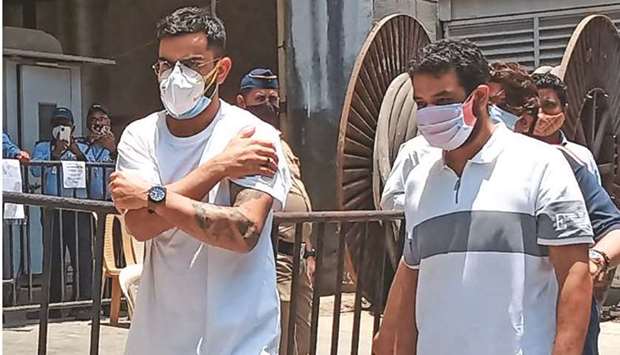India captain Virat Kohli and several of his teammates have received their first dose of Covid-19 vaccines before they leave for a tour of England next month. India face New Zealand in the final of the inaugural World Test Championship at Southampton in June before playing a five-Test series against England from Aug 4.
India’s novel coronavirus cases rose by 329,942 yesterday, while deaths from the disease rose by 3,876. The country leads the world in the daily average number of new deaths reported, accounting for one in every three deaths reported worldwide each day, according to a tally.
“Vaccinate yourself as soon as you can please. Stay Safe,” Kohli said an Instagram message after posting a photo of him being vaccinated on Monday. Kohli’s Test team ates Ajinkya Rahane, Cheteshwar Pujara, Ishant Sharma and Umesh Yadav have also posted messages on social media saying they have received the first jab.Most of the players had been playing in the Indian Premier League (IPL), which was suspended indefinitely last week because of the pandemic. India began a vaccination drive for those above 18-years-old on May 1.
Indian athletes preparing for the Tokyo Olympics, including the men’s and women’s hockey teams, have also received their first dose of the vaccine. Members of the shooting contingent also received their first dose before leaving for a training camp in Croatia yesterday.
English cricket chiefs blame virus for £16.1mn annual loss
The England and Wales Cricket Board (ECB) reported an annual loss of £16.1mn ($22.8mn) yesterday, saying the coronavirus pandemic had whittled down cash reserves to just £2.2mn. In 2016, the ECB announced it had reserves of more than £70mn.
But the start-up costs associated with the Hundred, the ECB’s new 100 balls-per-side competition, helped reduce that figure to about £11mn by 2019 — before the pandemic took hold. The Hundred is due to make its debut in 2021 after a year’s delay because of Covid-19.
The ECB said revenue losses across English cricket as a whole, after a year of playing matches behind closed doors, amounted to more than £100mn. But that is some way short of the worst-case scenario.
The ECB feared it could lose £380mn had the entire 2020 season been wiped out but a full international programme went ahead in a bio-secure bubble. “This has been a challenging year,” said Scott Smith, chief financial officer at the ECB.
“But by being able to stage international cricket and by taking decisive action early in the pandemic, we have been able to support the network and avoid a far worse financial scenario. There remains considerable uncertainty over the year ahead, but we hope that delivering another full summer of cricket — and with crowds beginning to return from next week — we are able to protect the revenue we need to invest in growing our game.”
ECB revenue fell by £21mn to £207mn. The financial statement said the delay to the Hundred and costs of staging bio-secure cricket had contributed to the decline.

Indian cricket captain Virat Kohli clutches his arm as he walks out after receiving a dose of the Covid-19 coronavirus vaccine in Mumbai on Monday. (AFP)
